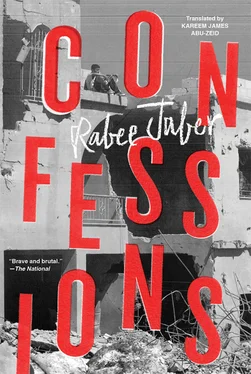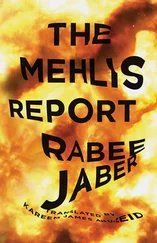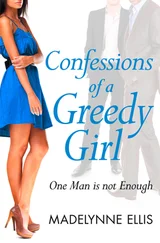She had booked a spot on a ship that sailed regularly from Jounieh to Cyprus. All of East Beirut traveled that way back then because the road to the Beirut Airport was blocked. The airport was in West Beirut, and it was easier to cross the sea to the Larnaca Airport in Cyprus. I remember her closing the suitcases and tying small red ribbons around the handles so she’d recognize them once she arrived in Paris. I remember her taking a teacup she loved — a teacup with Chinese drawings on it — out from among the dishes and trays in the cupboard, and how she took her time as she wrapped the cup in an old newspaper. I remember music coming in through the window, and I remember the one suitcase that remained open till the very last minute, and how the light of the setting sun filled it. I didn’t feel sad. I was happy for her.
Was I happy? My father, who was standing on the balcony in the middle of the canaries, waved to her as she walked to Ilya’s new black Range Rover. The sky was overcast, but the sun came out for a moment and I saw my father up above, among the birds spreading their feathers, and he seemed to be smiling. Was he really smiling? I told you memory can play tricks on us.
I remember us in the Range Rover, and I remember Najwa turning around for a moment, double-checking that all her bags were there, and looking through the darkened glass at the ghost left behind on the canaries’ balcony. Najwa never saw my father again. She didn’t come to the funeral when he died.
Ilya’s Range Rover took us to Jounieh on that overcast day. He later gave that car to Liliane as a present when she got into the Jesuit University. She studied there on a fellowship, and I studied at the American University (AUB), also on a fellowship. When I applied to AUB, I was expecting to be studying at the East Beirut branch. I didn’t know at the time that the war would end suddenly, that the East Beirut branch would close, and that I’d find myself a student in West Beirut. I submitted my application and took the entrance exams. There were three exams. The first was called S.Q., and was a science and math exam. The second was called E.E., and tested one’s English. And the third was the “skills” exam, which was for people who wanted to study engineering. I took those exams before the end of my senior year of high school. School was frequently disrupted back then. I told you that after the death of my mother, I felt like I was walking through fog — did I tell you that? When I think back to Mary’s wedding, for example, it’s all very hazy: people were dancing and I couldn’t understand why. I remember the decorated cars in front of the church, the flowers (their smell was suffocating), the photographer, and how he stuck his video camera — and then his head — out of the car’s open sunroof. I remember Ilya with his friends, a procession of Range Rovers, green and silver and black. And I remember young girls carrying trays of baklava and chocolate…. I remember the children in their shiny shoes and black neckties, and Mary in a dress that fanned out like a white cloud, that spread like the fog that trailed me from Sioufi to the church, and then to the strange house where Mary would be living from that day on, then back to Sioufi again. What was I feeling? I didn’t feel anything. How did I feel on the sidewalk in Jounieh when the long ship started moving and the colored balloons rose to the sky? — and who sent them up? How did I feel when we got back home — just Liliane and father and I? And how did I feel when Liliane asked me if I had a girlfriend at school?
I swam through the fog for years. I was always wearing a black leather jacket back then, which Ilya had given to me on one of his short trips to the house during the battles on Mount Lebanon. When I first tried it on in front of the mirror by the stairs (there was an old closet near the stairs leading up to the roof, and there was a mirror on the closet door), I heard him laugh and say I’d lost weight while he was away. As the years passed, I put on some weight and began to fill in that black jacket. The leather cracked while I was swimming in the fog. At school we used lighters on our jackets to know which were real leather and which were fake. I don’t know how those years flew by: large parts of that period escaped my memory unseen, as if the years had fallen into that thick fog as I was walking forward, as I was trying to turn around to see where they’d landed, as I was trying to stay present. I lost them, and maybe there’s nothing I could have done. Now, if you asked me which of my memories are real and which are false, it would bring up a lot of fear. I’d be afraid of not being able to tell them apart, afraid of losing myself between two people.
The clashes in the heart of East Beirut shut down the school on several occasions. Sometimes I felt I’d never make it to college, that I’d be stuck in that high school for all eternity. I didn’t want to be stuck there, but at the same time I didn’t know where to go. I wasn’t Ilya. I used to watch Ilya buying and selling cars, then working for secret organizations, and then going back to cars again. I used to watch him and feel a terrifying impotence: I felt I was weak. Once he took me to see his place in Furn al-Shabbak. On the way there he bought some falafel from a store, and some roasted chicken from another store, and “something to drink” from a third store. At each stop, he’d grab his gun as he got out of the Dodge, and when he returned he’d throw the bags in the back seat and set his gun down on the floor of the car. Every time he got out of the car, he’d slip the gun under his belt. I thought we’d never make it to his place. He kept taking back roads, turning left and then right…. I asked him if he was lost. He laughed, smacked the steering wheel, and he said he loved spending time with me, that he missed me. He asked me why I didn’t come and live with him. “But where’s your place?” I replied, and he started laughing again. He asked me if I ever went to the movies, and if I had a girlfriend….
“She seems interested.” That’s what Antoine Tannouri said to me in English when the dance was over.
He and I were getting ready for the E.E. exam together and trying
to talk to each other in English as much as possible. At that party, everyone was speaking English and laughing. That was something unique to the parties in Achrafieh during the War of Elimination. After speaking in English, Antoine would laugh and adjust his glasses on his nose. I hadn’t noticed she was interested until he said so. In general, I never noticed anyone, and never thought that she — or anyone else — could be interested in me: I didn’t notice because I wasn’t there — but where was I? I don’t know. On our second dance, when the music was slow, she spoke into my ear. She dropped the English and told me she liked the way I walked: she always saw me on the street and she liked how I walked. No one had ever told me there was something special about the way I walked. I didn’t know that.
I remember her blue Mujer sweater, and its soft fabric. After that, anytime I saw her dancing in that sweater I’d tell her I felt something moving in my heart. But I didn’t tell her I was falling for her as she pulled me closer while we danced. She pressed me against her body, and I felt the beating of her heart, the solidity of her body. I felt no fear, and I thought it was the very first time I hadn’t felt fear. But I was afraid. Was that fear?
Weeks later, when we were at the cinema, her hand in mine, I remembered Ilya laughing in the Dodge and smacking the wooden dashboard. The clashes were moving from one area of East Beirut to another, and we took advantage of each “period of ceasefire” to see a new movie.
I’d drive her car while she switched stations on the radio and the night spread over the sea. We’d talk or make out in the parking lot while we waited for the movie to start. Back at the car after the movie, we’d take our time leaving the lot. I remember a tree with many branches, and the thick shadows beneath it. I remember the cars’ headlights.
Читать дальше












